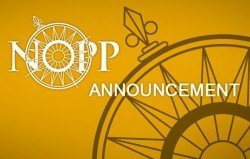NOPP Names “Marine Mammal Detection and Monitoring” Funding Award Winners
Scientists from Four Universities Awarded Multiple-Year Funds for Marine Mammal Detection, Classification and Localization
Washington, DC – The National Oceanographic Partnership Program (NOPP) is pleased to announce five award recipients from the “Marine Mammal Detection and Monitoring” solicitation for fiscal year 2011 sponsored through funding provided by the Office of Naval Research (ONR); the National Science Foundation (NSF); the National Oceanic and Atmospheric Administration (NOAA); and the Bureau of Ocean Energy Management, Regulation and Enforcement (BOEMRE); American Petroleum Institute (API); and the National Fish and Wildlife Federation (NFWF).

Government agencies and industries that operate in the marine environment frequently need to be able to detect, locate and identify marine mammals during their activities (i.e. naval exercises or geophysical surveys). Following a peer-review process, five research projects submitted from university, government and industry collaborators were awarded funding to pursue advances on this front. The awardees will focus on research activities such as developing new marine mammal detection/classification/localization algorithm development, acoustic metadata management, visualization and data processing and autonomous vehicle capabilities to enhance monitoring and mitigation during marine operations.
“The proposals chosen for this funding announcement clearly demonstrated the public and private partnership that we strive for at NOPP,” said Leigh Zimmermann, NOPP Office Program Manager. “We look forward to seeing the results of this high-level ocean science research that will be used to create DCL tools for government agencies, academia and industry.”
The award recipients are as follows:
- Cornell University
- Lead Principal Investigator: Christopher Clark
- Proposal topic: “DCL System Using Deep Learning Approaches for Land-based or Ship-based Real-time Recognition and Localization of Marine Mammals”
- Funding total: $1,048,861
- Length: Three years
- Cornell University
- Lead Principal Investigator: Christopher Clark
- Proposal topic: “Portable and Persistent Autonomous Real-Time Marine Mammal Acoustic Monitoring”
- Funding total: $1,049,818
- Length: Three years
- Duke University
- Lead Principal Investigator: Patrick Halpin
- Proposal topic: “Expansion of metadata management, visualization and data processing functionality of OBIS-SEAMAP”
- Funding total: $317,993
- Length: Two years
- Northeastern University
- Lead Principal Investigator: Purnima Ratilal
- Proposal topic: “Instantaneous Passive and Active Detection, Localization and Monitoring of Marine Mammals over Long Ranges”
- Funding total: $431,978
- Length: Three years
- San Diego State University
- Lead Principal Investigator: Marie Roch
- Proposal topic: “Acoustic Metadata Management and Transparent Access to Networked Oceanographic Data Sets”
- Funding total: $855,499
- Length: Four years
For more detailed information on each funded project, as well as a list of partnering institutions, click here.
For more information on NOPP, visit the program’s website.
Media Contact:
Kristin Mellon
202-787-1644
[email protected]
###
About Consortium for Ocean Leadership
Ocean Leadership is a Washington, D.C.-based nonprofit organization that represents 96 of the leading public and private ocean research education institutions, aquaria and industry with the mission to advance research, education and sound ocean policy. The organization also manages ocean research and education programs in areas of scientific ocean drilling, ocean observing, ocean exploration and ocean partnerships.
About National Oceanographic Partnership Program
The National Oceanographic Partnership Program (NOPP) is a program of the Consortium for Ocean Leadership. NOPP facilitates collaborations between federal agencies to identify and fund scientific partnerships among academia, government, industry and other members of the ocean science community. These partnerships have strengthened and expanded oceanographic research for more than a decade.


